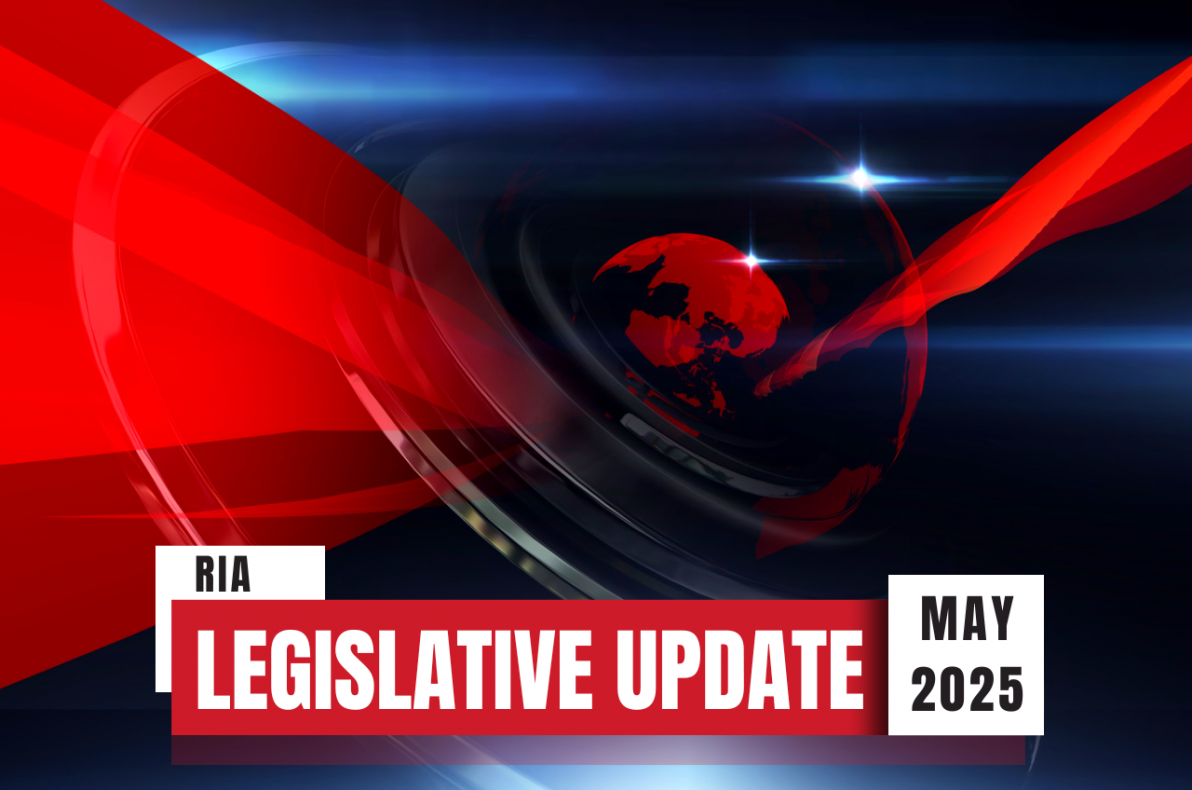May 2025 Legislative Update

RIA's AGA Legislative Task Force is responsible for monitoring legislation across the United States that may impact restoration professionals in the areas of mold remediation, contractor laws & regulations, contracts, prevailing wage and more. The following update is being provided to help RIA members stay informed of key legislative developments.
The RIA encourages members to report legislative issues in their state to the RIA's AGA Legislative Task Force for review.
Right to Cancel Contracts
CA SB784: This bill proposes significant consumer protection reforms for home improvement loans and contracts. It extends the right to cancel home improvement contracts from 3 to 5 business days for most consumers, and from 5 to 7 business days for senior citizens, effective January 1, 2026.
CT HB06967: This bill provides for the right to cancel contracts within three business days. The bill does not explicitly provide an exemption from the right to cancel contracts for emergency restoration services, which could have a negative impact on urgent water mitigation and disaster response work. The RIA is actively advocating for amendments to clearly define "emergency restoration services" and establish an exemption from the right to cancel contracts to ensure restoration professionals can respond quickly without unnecessary delays.
NJ A551: proposes extending the cancellation period for home improvement contracts from three to five business days but does not specifically provide an exemption for emergency restoration services with the right to cancel contracts. Since delays in emergency response can worsen property damage and health risks, legislators have made floor amendments to the bill from RIA's AGA Legislative Task Force to define "Emergency Restoration Services" and create an exemption for these services which will be voted on in June.
Contractor Licensing
CT HB6965: Proposes a new licensing framework for fire restoration contractors. The RIA and IICRC have raised concerns regarding duplicative regulation and unnecessary burden on restoration professionals and are in active discussions with legislators and have provided sample language focusing on industry standards and certifications.
NJ A1457 requires the licensure of general contractors in the state and defines a "general contractor" as an individual or business that can be classified under certain construction trade categories. The bill outlines the eligibility requirements for licensure, including education, field experience, and passing an examination. It also provides some exemptions for experienced general contractors and those licensed in related professions. The RIA is lobbying for a definition of and exemption for emergency restoration services to be included in this bill along with the Senate companion bill S4088.
SC HB4518: Proposes amendments to the South Carolina Code, introducing a new category of "residential trade registrants" and defining the practice of "residential trade contracting." The bill aims to regulate construction-related activities that involve specialized trades or crafts that are not currently tested for licensure under existing law. While the bill’s intent is to close regulatory gaps, the inclusion of loosely defined terms such as "repairs" and "reimprovement" raises concerns about whether emergency mitigation contractors—particularly those performing non-structural, stabilization-focused work—could be unintentionally swept into the new licensing and bonding requirements.
Fire Remediation
TX HB4169: Adds new contract and notice requirements for fire remediation work under insurance claims. The RIA actively lobbied against the bill as written, providing early-stage comments and the bill sponsor has agreed to make major revisions to the bill to incorporate RIA's feedback to support consumer protection while supporting restorers.
Mold Remediation
IA HF731: This bill establishes comprehensive regulations for mold remediation in Iowa, creating new definitions and requirements for mold removal services. It defines key terms such as "mold" (multicellular fungi found in water-damaged environments) and "direct supervisor" (an on-site professional who oversees mold remediation activities). The bill requires all mold remediation to follow the ANSI/IICRC S520 professional standard or a similar standard approved by the Department of Inspections, Appeals, and Licensing (DIAL). DIAL must create a registry of mold remediation service providers, and these entities must have a direct supervisor with a third-party certification from recognized professional organizations.
Price Gouging
CA SB36: This bill addresses multiple aspects of consumer protection during states of emergency, with a focus on preventing price gouging and protecting displaced individuals. Specifically, the bill expands existing laws to impose additional civil penalties on businesses that exploit consumers during emergencies. It introduces new requirements for housing listing platforms to monitor and report potential price gouging, and adds provisions that allow for increased penalties when unfair business practices target people displaced by emergencies. The bill defines price gouging as charging prices more than 10% higher than pre-emergency rates for essential goods and services, and extends these protections to all counties within 50 miles of an emergency declaration.
NY S07345: This bill amends the New York General Business Law to more precisely define and regulate price gouging during states of emergency, establishing clear guidelines for what constitutes an "unconscionably excessive price." Specifically, the bill provides that a price increase is not considered excessive if it is 10% or less above the seller's pre-emergency price, current prices in non-emergency areas, the seller's acquisition or replacement cost plus customary markup, or if the price is due to normal market fluctuations or pre-existing contract terms.
US HR2427: This bill establishes federal protections against price gouging during major disasters or emergencies declared by the President. Under the bill, sellers are prohibited from increasing prices more than 10 percent for essential consumer goods and services, hotel lodging, and residential rental properties for 30 days, and for repair or reconstruction services for 180 days after a disaster declaration. Sellers cannot charge prices more than 50 percent greater than their original cost. The bill allows some exceptions for price increases directly attributable to additional supplier costs, labor, materials, tariffs, or pre-existing contractual agreements. The Federal Trade Commission (FTC) will enforce these provisions, treating violations as unfair or deceptive practice.
